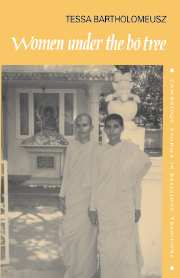Book contents
- Frontmatter
- Contents
- Preface
- Acknowledgments
- Notes on pronunciation
- Dramatis personae
- PART I
- Introduction: The tradition of Buddhist female renunciation in Sri Lanka
- 1 The ancient order of nuns in Sri Lanka
- 2 Nineteenth-century Ceylon: the emergence of the lay nun
- 3 Theosophists, educators, and nuns
- 4 The Saňghamittā Sisterhood
- PART II
- Epilogue: Women under the Bō tree
- Appendices
- Notes
- Select bibliographies
- Index and glossary
3 - Theosophists, educators, and nuns
Published online by Cambridge University Press: 05 November 2011
- Frontmatter
- Contents
- Preface
- Acknowledgments
- Notes on pronunciation
- Dramatis personae
- PART I
- Introduction: The tradition of Buddhist female renunciation in Sri Lanka
- 1 The ancient order of nuns in Sri Lanka
- 2 Nineteenth-century Ceylon: the emergence of the lay nun
- 3 Theosophists, educators, and nuns
- 4 The Saňghamittā Sisterhood
- PART II
- Epilogue: Women under the Bō tree
- Appendices
- Notes
- Select bibliographies
- Index and glossary
Summary
INTRODUCTION
Some of the women who renounced the world in the late nineteenth century went so far as to join women like themselves in a lay nunnery. Ceylonese patriots, foremost among them the celibate Anagārika Dharmapāla, a Buddhist Theosophist and a symbol of religious and national pride, encouraged their activities and wrote that they were necessary for the welfare of Buddhism in the island. Since his early years, when he was known as Don David Hewavitarane, Dharmapāla had maintained an interest in Buddhism, especially as it relates to the daily life of the laity. As a youth, having witnessed the Pānadura debates of 1873, in which a Buddhist monk emerged the victor in a series of debates with a Methodist minister, Dharmapāla developed the courage to fight in the moral battle for his country. Though the Pānadura victor was a monk, Dharmapāla argued that both monk and laity should be involved in the revival and maintenance of Buddhism. In other words, he maintained that Buddhism was meant as much for the monk as for the layperson (upāsaka); indeed, in the context of his day, the duties of the upāsaka needed as much reinterpretation as the role of the monk. Dharmapāla argued that Ceylon Buddhism needed to be reformed, and that it should be reformed in accordance with the ancient texts. He wrote, for instance, that canonical Buddhism offered women far more freedoms than other religions, and that women should reclaim those freedoms. In addition to encouraging women out of their domestic sphere, he urged Buddhists of different caste affiliations to unite in the struggle against the British.
- Type
- Chapter
- Information
- Women under the Bo TreeBuddhist nuns in Sri Lanka, pp. 44 - 67Publisher: Cambridge University PressPrint publication year: 1994



